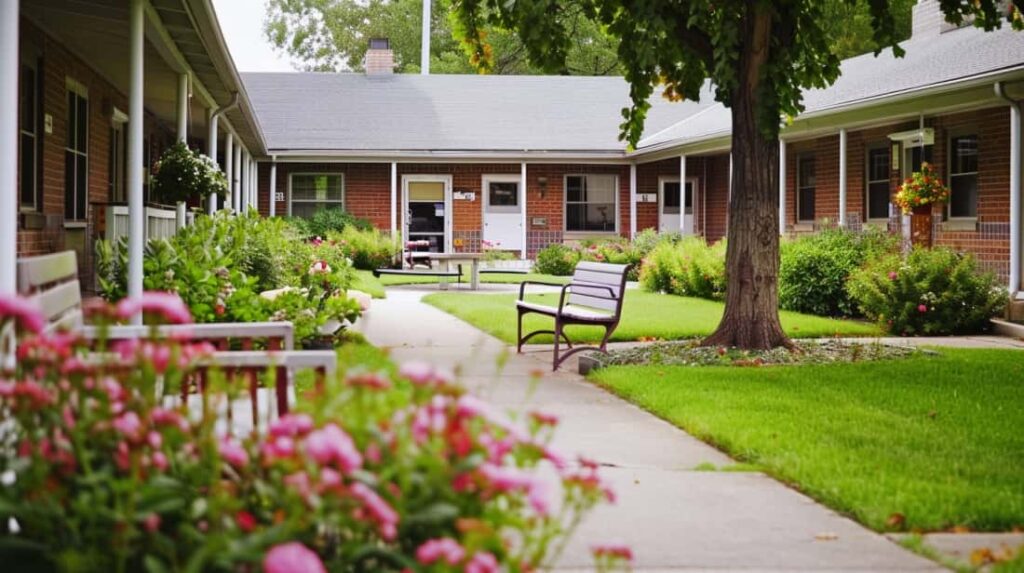Millions of people are impacted by dementia, requiring specialized care to effectively address its symptoms. Facilities dedicated to individuals with dementia offer a variety of services designed to cater to the diverse needs of those with different forms of dementia, such as Alzheimer’s disease. These establishments create a well-organized setting where individuals can receive customized care and assistance.

Choosing the right long-term care facility is critical. It involves understanding the specific needs of the person living with dementia and the level of care each facility offers. From memory care units to skilled nursing facilities, each option has its unique benefits, designed to enhance the quality of life for dementia patients.
This guide will explore the different types of long-term care facilities available for dementia patients, offering insights into how they cater to the nuanced needs of those they serve. By the end, readers will be better equipped to make informed decisions about the care of their loved ones.

Understanding Dementia and the Need for Specialized Care
Dementia encompasses a range of neurological disorders that affect memory, thinking, and social abilities severely enough to interfere with daily life. It’s not a specific disease but a general term that describes a wide range of symptoms associated with declining brain function. The most common cause of dementia is Alzheimer’s disease.
Given the progressive nature of dementia, affected individuals often require specialized care that goes beyond what families can provide at home. This is where assisted living facilities come into play, offering a blend of residential accommodation, personal care support, and healthcare services tailored to the individual’s needs.
The Impact of Dementia on Daily Living

For a person living with dementia, the impact on daily living can be profound. Simple tasks that once were second nature, such as dressing, eating, or engaging in conversation, become increasingly challenging. This decline in cognitive and functional abilities can lead to frustration and social withdrawal, significantly affecting their quality of life.
Furthermore, dementia can alter a person’s personality and behavioral patterns, leading to mood swings, aggression, or confusion. These changes not only affect the individuals but also place a considerable strain on their families and caregivers, highlighting the need for specialized support and care.
Evaluating the Types of Dementia Care Available
When considering care for someone with dementia, it’s important to evaluate the types of dementia care available. Specialized care, offering 24-hour supervision, is crucial as dementia progresses. Various forms of dementia require different approaches to care, making it essential to choose a residential care facility that can provide both short-term care and adapt to changing needs over time.

In-Home Services vs. Residential Care: Comparing Options
Deciding between in-home services and residential care depends on the level of independence and the type of care needed. In-home services allow for independent living with the support of staff members who assist with daily activities and medical needs. However, long-term care facilities, such as nursing home care or continuing care retirement communities, offer more comprehensive services, including supervised care and access to medical professionals.
While residential facilities provide a higher level of care, they also come with a different cost structure, often requiring long-term care insurance. Each option has its benefits, and the choice should be based on the individual’s specific needs, preferences, and the progression of their condition.

Navigating the Maze of Long-Term Care Facilities
Finding the right long-term care facility for a loved one with dementia involves understanding the specialized care they require. This includes 24-hour supervision and tailored services to manage the various forms of dementia effectively. The process can be daunting, but knowing the specific needs of your loved one can guide you through the maze of options available.
Assisted Living Facilities: A Closer Look
Assisted living facilities provide a balance between independence and the need for medical care. Staff members are available to assist with daily living activities, monitor health, and ensure that medical appointments are kept. These facilities often offer a range of living arrangements, catering to different levels of care needs.

The costs of care in assisted living facilities vary and can be covered through long-term care insurance or out-of-pocket payments. Understanding these costs and exploring how to manage paying for care are essential steps in finding the right living arrangements for your loved one.
Alzheimer’s Special Care Units/Memory Care Units: What Sets Them Apart
Alzheimer’s special care units, or memory care units, are designed to meet the unique needs of seniors with memory-related conditions. These specialized senior care facilities provide a secure environment to minimize confusion and wandering, crucial for the safety of an individual with Alzheimer’s. Staff in these units are specially trained to handle the challenges associated with dementia symptoms and are adept at providing personalized care.

Memory care units often work in conjunction with health insurance plans to cover the cost of care. Unlike traditional nursing home residents, individuals in memory care receive focused attention that caters to the stages of dementia as symptoms worsen, ensuring they receive the appropriate level of support throughout their journey.
Skilled Nursing Facilities: When Is It the Right Choice?
Skilled nursing facilities offer comprehensive medical care and are staffed by professional healthcare providers capable of administering around-the-clock care, including medical procedures such as wound care and personal care assistance. This level of care is suitable for individuals whose medical needs cannot be adequately met in other settings. Coverage for these services can be provided by Medicare’s nursing component or through long-term care insurance.

Nursing Homes: Understanding the Level of Care Provided
Nursing home care provides a high level of medical and personal care for those who cannot be cared for at home or in other facilities. These settings offer memory care communities for those with dementia, where space is shared with others but tailored to minimize stress and confusion.
Choosing a nursing home involves considering the specific care needs of the individual, including access to specialized dementia care and the ability to handle complex health issues. Nursing homes are equipped to provide comprehensive care and support, making them a suitable option for those requiring intensive medical and personal care.

Financial Considerations for Dementia Care
When planning for the care of a loved one with dementia, understanding the financial aspect is crucial. The costs can vary widely, depending on the type of care and the facility chosen. It’s important to explore all payment options early in the process. This includes private pay, insurance coverage, and possible government assistance. Knowing these options can help families manage the financial burden of long-term care.
Additionally, the cost of care may increase as the needs of the person with dementia change over time. Planning for these potential changes in advance can help families avoid financial strain. It’s also beneficial to seek advice from financial advisors who specialize in elder care. They can offer guidance on how to maximize resources and minimize costs while ensuring the loved one receives the best possible care.

Exploring Payment Options for Long-Term Care
There are several ways to pay for long-term care, including out-of-pocket payments, long-term care insurance, Medicaid, and other government programs. Each option has its own set of eligibility requirements and benefits.
For instance, Medicaid may cover the full cost of care for eligible individuals, but not everyone qualifies. Long-term care insurance can provide comprehensive coverage, but it must be purchased before the individual requires care. Understanding these options can help families make informed decisions about how to finance long-term care.

The Cost Difference Between Memory Care and Nursing Homes
The cost of memory care communities and nursing homes can differ significantly. Memory care communities are specialized for individuals with dementia and often provide a higher level of care tailored to their needs.
These communities focus on safety, with secure environments and programs designed to improve the quality of life for residents. Because of the specialized care and enhanced security features, memory care can be more expensive than traditional nursing homes, where the space is shared with individuals with various health needs.

Moreover, the pricing structure between these two options can vary. Nursing homes typically charge a flat rate that covers all services, while memory care communities might have a base rate with additional costs for extra services. Understanding these differences is key for families to budget effectively for their loved one’s care. Comparing the services provided and the associated costs can help determine the best option, taking both the financial impact and the level of care into consideration.
Strategies for Managing the Cost of Dementia Care
Managing the cost of dementia care requires a strategic approach that balances quality care with financial sustainability. Exploring different payment options, such as long-term care insurance, Medicare, or Medicaid, can provide some relief. It’s crucial to understand what each program covers and the eligibility requirements. Families should also consider life insurance policies that can be converted into care funding, as well as any available veteran benefits.

Another effective strategy is to consult with a financial planner who specializes in eldercare. They can offer personalized advice on managing assets and investments to fund dementia care. Utilizing resources like the Eldercare Locator can help families connect with local agencies that provide financial support or sliding scale fees based on income.
Careful planning and utilization of available resources can significantly ease the financial burden of dementia care.

Making the Decision: From Assessment to Placement
Deciding on the appropriate long-term care for a dementia patient begins with a thorough care assessment. This assessment, often conducted by healthcare professionals, evaluates the individual’s medical needs, daily living abilities, and social needs.
It serves as a guide to determining the most suitable care option, whether it be in-home services, an assisted living facility, or a memory care unit. Understanding the patient’s condition and needs is crucial in making an informed decision.

Once the assessment is complete, families can start exploring various care facilities. Visiting each center, meeting with the staff, and understanding the level of care provided are essential steps. During visits, it’s important to observe the environment and assess whether it feels welcoming and safe for the patient. The decision should be a balance between the patient’s care needs, the family’s financial capacity, and the quality of life the facility can provide.
How to Use a Care Assessment Guide for Decision Making
A care assessment guide is a valuable tool in navigating the complex decision-making process for dementia care. It outlines the patient’s health status, cognitive abilities, and care needs. By identifying these aspects, families can better match the patient with the right type of care facility. The guide often includes a checklist of services and amenities to look for, helping families evaluate if a facility meets the patient’s requirements.

In addition to the checklist, the guide may offer advice on how to communicate effectively with healthcare providers and care facilities. This ensures that all of the patient’s needs are fully understood and addressed. By systematically using the care assessment guide, families can make a well-informed decision that aligns with the patient’s best interests and enhances their quality of life.
The Process of Selecting the Right Long-Term Care Facility
Selecting the right long-term care facility involves careful consideration of the patient’s needs, the family’s budget, and the quality of care provided. It’s a decision that requires visiting multiple facilities, asking the right questions, and evaluating each center’s ability to cater to the unique challenges of dementia care. Ensuring the facility has a robust activity program, experienced staff, and a safe environment is crucial.
Factors to Consider When Choosing a Facility for a Loved One

When choosing a facility for a loved one with dementia, several key factors must be considered. The staff-to-patient ratio is critical, as it impacts the level of individual attention and care each patient receives. The facility’s experience and training in handling dementia patients are also vital, as specialized care is required to manage the symptoms and progression of the disease effectively.
Additionally, the facility’s environment and available amenities play a significant role in the patient’s quality of life. A center that offers engaging activities, outdoor spaces, and opportunities for social interaction can greatly benefit dementia patients. Families should also consider the center’s policies on visits and how they integrate family involvement in the care plan. These factors collectively contribute to making an informed choice that ensures the best care for the loved one.

Final Thoughts on Selecting Long Term Care for Dementia Patients
Selecting long-term care for dementia patients is a journey filled with careful consideration and emotional decisions. It’s about finding a place where loved ones will receive the care they need while being treated with dignity and respect. The process demands patience, thorough research, and often, difficult conversations with family members. However, the goal is always clear: to ensure the best possible quality of life for the patient.
Ultimately, the decision on the right care facility should be guided by the patient’s specific needs, the family’s financial capability, and the quality of care the facility provides. Whether it’s a memory care facility, assisted living, or in-home care, the choice must prioritize the patient’s well-being and mental health. With the right approach and resources, families can navigate this challenging journey and find a suitable care solution that meets their loved one’s needs.

The Journey to Finding the Best Care Solution
Finding the best care solution for a dementia patient is a journey that involves evaluating various care homes, assisted living and nursing homes, and consulting with agencies on aging. It’s a process that requires understanding the patient’s life expectancy and how it aligns with the services provided by these facilities. Utilizing resources like life insurance policies to fund care can also be a crucial part of this journey. Ultimately, the aim is to secure a care solution that offers the best quality of life for the patient.
Emphasizing the Importance of Quality Care in Dementia Facilities
Quality care in dementia facilities is paramount to ensuring that patients live their lives with dignity and comfort. This means having a trained staff that understands the complexities of dementia and can provide personalized care that addresses each patient’s unique needs. Facilities must also offer a safe and stimulating environment that encourages patients to engage in activities that improve their well-being.
Moreover, family involvement is crucial in the care process. A facility that values open communication with families and includes them in care planning ensures that patients receive the support they need. Emphasizing the importance of quality care in dementia facilities not only benefits the patients but also provides peace of mind to their families, knowing that their loved ones are in good hands.









